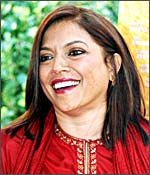 | « Back to article | Print this article |
The BBC's Talking Movies recently featured host Tom Brooke chatting up producer and director Mira Nair and they spoke of her style, the upcoming film, Harry Potter, and lots more.
Nair is at the moment working on The Namesake, starring Kal Penn and Tabu, which is based on Jhumpa Lahiri's book of the same name and is scheduled for a November release. Here are some excerpts:
What are the hallmarks of a Mira Nair film? For example, with Robert Altman, you know people talk about, ensemble work, perhaps the use of music to some extent, overlapping dialogue. Are there things that really could be called characteristics, if a film theorist looked at your work?
That's their job. My job is spinning the tales. But in terms of the style of telling it, I feel sometimes the subject matter defines for me the style. I like to milk every moment. I use music fairly pointedly, and I love to make people laugh and then unbelievably cry at moments of the spin of a coin.
How forceful are you as a director? Can you be a pain in the neck?
I don't think pain actually yields beautiful work. I think that if I feel the pain myself, I must not show it. I must create harmony because you can't force excellence. As a director the task is to make everyone bloom without straining and my practice in yoga really helps me as a director because amongst many things, yoga keeps ego away.
Looking at The Namesake, why does Mira Nair want to bring Hollywood and Bollywood actors together?
Simply because they were the best actors for that story that spans thirty years. It starts in Calcutta in the 70s and comes to New York City and ends today. It's about a Bengali couple who leave and become professors here and their children who are very American and so on, who are born here. I wanted very much to get Indian actors from India, who feel that world, and also Indian-American actors from here to play their children because they are totally American kids. Kal Penn, who did such a stunning comic turn in Harold and Kumar Go To Whitecastle wanted to make his first dramatic movie and he just blew me away with the authenticity of his reading.
Irrfan Khan, who plays his father Ashoke, is actually somebody I discovered when he was 18. He played his first film in Salaam Bombay and has become a great star since then. Tabu, who plays Ashima has given the most amazing performance. She's a great actress with more than 100 movies that she's done and her eyes have the gravitas of life.
 There's a lot in the press nowadays as you know about India being this kind of emerging giant. And with actors in India there is frequently the idea that in order to have made it, you have to have crossed over to the West. Do you think it's wrong to use that yardstick in a way?
There's a lot in the press nowadays as you know about India being this kind of emerging giant. And with actors in India there is frequently the idea that in order to have made it, you have to have crossed over to the West. Do you think it's wrong to use that yardstick in a way?
I have no desire to be part of the school which believes that India has arrived only when the West recognises us. It's complete nonsense because India's film industry has nourished half the world for half a century, and its only now with the media explosion on both sides -- in India and of course the West coming to India; let's not make any bones about it, that 300 million middle class who are ready to spend their bucks in India is clearly a market for Hollywood -- that both sides are now entertaining each other in a way.
The Indian film industry is very resilient to outsiders but right now there is a Hollywood studio in Bombay involved in producing a film in Bombay, in Hindi, for an Indian audience. (Sony Pictures is producing Sanjay Leela Bhansali's next, Saawariya) What do you make of that development? Does it concern you or do you think it's a good development?
I think it's bound to happen, Tom. Because the market is there and money rules the movie business. I think though, that the Indian film industry is so energetic and muscular, and has been so for over 100 years, that it'll take a lot to flatten us down. I feel that, all this hybridisation will happen and then hopefully we'll achieve some sort of plateau where we both understand each other.
Do you feel then ambivalent towards Hollywood? Because I know there were overtures made to you about doing a Harry Potter film, but ultimately you didn't do it. Are you nervous about getting involved with the studio system?
No. Actually, I have very good relationships in the studio system and I feel a great sense of respect. I also find a sense of desire on their part to honour my opinion because it is a turf still new for them. But there are subjects that I occasionally really want to insist on, because I fear that if the subjects are from my part of the world, the songs that I have sung and the stories that I know, then they better get it right.
The complete Talking Movies interview will be aired on BBC World, Wednesday 2nd August at 2 pm; Thursday 3rd August at 8pm; and Friday 4th August at midnight.